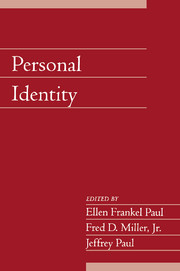Book contents
- Frontmatter
- Contents
- Introduction
- Acknowledgments
- Contributors
- Experience, Agency, and Personal Identity
- When Does a Person Begin?
- Persons, Social Agency, and Constitution
- Hylemorphic Dualism
- Personal Identity and Self-Ownership
- Self-Conception and Personal Identity: Revisiting Parfit and Lewis with an Eye on the Grip of the Unity Reaction
- The Normativity of Self-Grounded Reason
- Rationality Means Being Willing to Say You're Sorry
- Personal Identity and Postmortem Survival
- “The Thing I Am”: Personal Identity in Aquinas and Shakespeare
- Moral Status and Personal Identity: Clones, Embryos, and Future Generations
- The Identity of Identity: Moral and Legal Aspects of Technological Self-Transformation
- Index
Hylemorphic Dualism
Published online by Cambridge University Press: 05 July 2014
- Frontmatter
- Contents
- Introduction
- Acknowledgments
- Contributors
- Experience, Agency, and Personal Identity
- When Does a Person Begin?
- Persons, Social Agency, and Constitution
- Hylemorphic Dualism
- Personal Identity and Self-Ownership
- Self-Conception and Personal Identity: Revisiting Parfit and Lewis with an Eye on the Grip of the Unity Reaction
- The Normativity of Self-Grounded Reason
- Rationality Means Being Willing to Say You're Sorry
- Personal Identity and Postmortem Survival
- “The Thing I Am”: Personal Identity in Aquinas and Shakespeare
- Moral Status and Personal Identity: Clones, Embryos, and Future Generations
- The Identity of Identity: Moral and Legal Aspects of Technological Self-Transformation
- Index
Summary
I. Introduction
Despite the fact that it continues to have followers, and that it can be said to have enjoyed something of a micro-revival in recent years, dualism either in the philosophy of mind or in the theory of personal identity persists in being more the object of ridicule than of serious rational engagement. It is held by the vast majority of philosophers to be anything from (and not mutually exclusively) false, mysterious, and bizarre, to obscurantist, unintelligible, and/or dangerous to morals. Its adherents are assumed to be biased, scientifically ill-informed, motivated by prior theological dogma, cursed by metaphysical anachronism, and/or to have taken leave of their senses. Dualists who otherwise appear relatively sane in their philosophical writings are often treated with a certain benign, quasi-parental indulgence.
The “dualism problem,” as one might call it—the problem of the odd place of dualism as no more than an intellectual curiosity in current debate, its adherents characterized as “swimming against the tide”—is complicated by the fact that when it comes to attempts to describe and then, predictably, refute dualism, it is almost without exception the Cartesian form that takes center stage. There is, true to say, a respectable place for property dualism, the theory that although the mind is material, mental properties such as consciousness are not reducible to material properties such as states of the brain; and event dualism has begun to attract attention, this being the view that the correct distinction is between mental and physical events, such as thoughts on the one hand, which are irreducible to brain processes on the other.
- Type
- Chapter
- Information
- Personal Identity , pp. 70 - 99Publisher: Cambridge University PressPrint publication year: 2005
- 11
- Cited by

